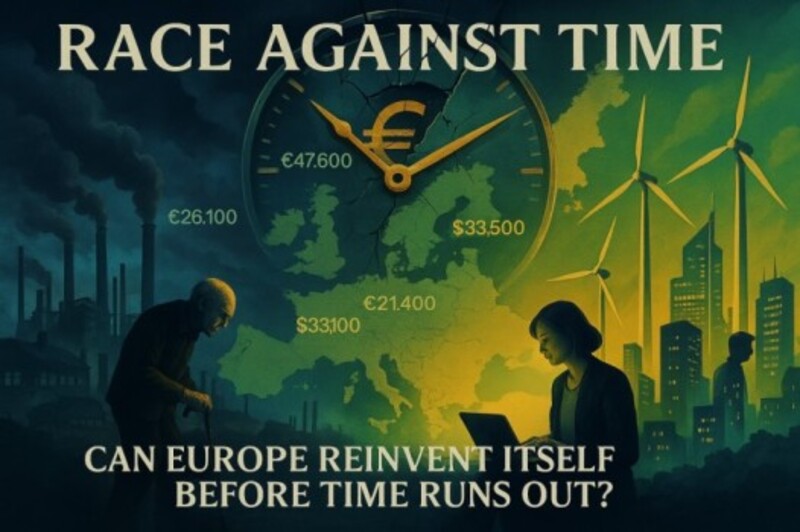 A flow of Investment funds from the United States to Europe. Photo Credits: AI Generated Image
A flow of Investment funds from the United States to Europe. Photo Credits: AI Generated Image
The Great Capital Shift: Why Investment Funds Are Flowing From The U.S. To Europe
For years, the U.S. stood as the world’s finance leader, attracting investments through strong economic growth and a surging stock market. However, early 2025 witnessed a dramatic shift, with investors increasingly favoring European markets over American assets.
Rising Concerns About the U.S. Economy
One of the primary reasons for this shift is growing skepticism about the U.S. economic outlook. The latest Bank of America Fund Manager Survey revealed that 83% of investors now expect a slowdown in the U.S. economy, a dramatic jump from 28% just a month earlier.
Persistent inflation, elevated interest rates, and looming recession risks have shaken investor confidence. With doubt clouding the U.S. market’s future, capital is searching for safer and more promising destinations—and Europe is emerging as a prime choice.
Europe’s Economic Revival: Fiscal Stimulus and Optimism
Meanwhile, Europe's economic outlook is brightening. Germany, widely regarded as Europe's economic powerhouse, has launched bold fiscal stimulus packages aimed at reviving industrial production and economic growth.
Investor sentiment reflects this momentum, with net optimism about European economic growth surging from 9% to 60% within two months. Increased defense spending across the continent, driven by geopolitical uncertainty and a push for greater autonomy, is also helping to lure global capital.
As European nations commit to long-term stability and structural reform, global investors are increasingly concentrating their attention on the continent.
Tariff Impacts and Supply Chain Realignment
Another critical driver of this capital migration is the disruptive effect of U.S. trade policies. American tariffs on European goods, and retaliatory measures from the European Union, have complicated supply chains and increased operational costs for U.S. firms.
Multinational corporations and investors are responding by pivoting to Europe, where trade stability and extensive economic alliances offer smoother business operations and lower costs. European countries have leveraged this opportunity, positioning themselves as more attractive investment hubs in a fractured global trade environment.
Valuations and Market Performance
The relative value between American and European stock markets has also contributed to the capital shift. While volatility has roiled the S&P 500, with a nearly 4% decline year-to-date, European blue-chip stocks have surged by 9%.
European equities are now perceived as undervalued but poised for growth, attracting institutional investors who seek greater returns amid global uncertainty.
Europe’s push toward energy independence and a greener economy has further revealed promising investment opportunities in renewable energy, technology, and infrastructure sectors, fueling even greater momentum.
Financial Industry Reaction
The financial sector itself is rapidly adjusting to these trends. Global investment leader BlackRock, among others, has introduced new services in Europe to capture growing local and international interest.
Examples include:
- Sustainable investment funds centered on green energy
- Private equity portfolios focused on European SMEs
- Tailored wealth management solutions reflecting local economic conditions
These efforts are not only attracting European funds but also accelerating the flow of U.S. capital into Europe.
Political Stability and Regulatory Certainty
Political factors are also pivotal in this dramatic shift. Increased regulatory pressure in the U.S., uncertainty about future monetary policy, and political stability concerns have made American markets less attractive.
In contrast, Europe, despite facing its own challenges, is being perceived as a more stable and predictable investment environment. Steps toward deeper economic integration and regulatory clarity have boosted investor confidence across the continent.
A Structural Transformation of Global Finance
The trend of reallocating funds from the U.S. to Europe represents a profound turning point in global finance. As long as the U.S. struggles with economic headwinds and Europe continues to stabilize its base, this realignment is likely to persist.
This capital migration is not a fleeting phenomenon but a reflection of deeper structural changes within the global economy. Investors worldwide are paying close attention, and the financial landscape is undergoing a transformation before our very eyes.



